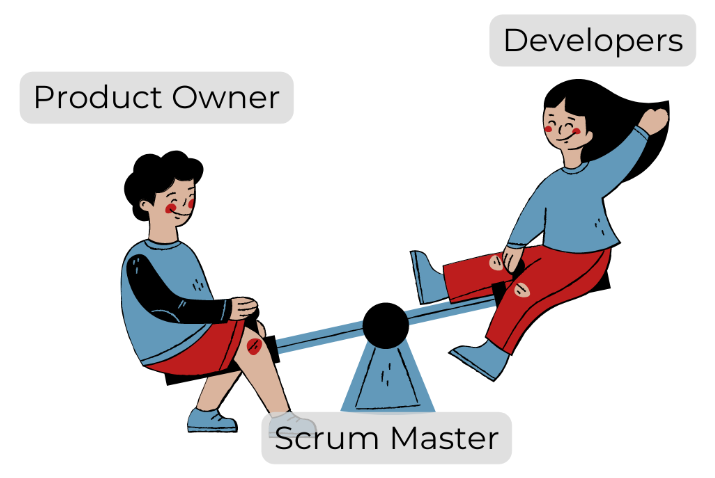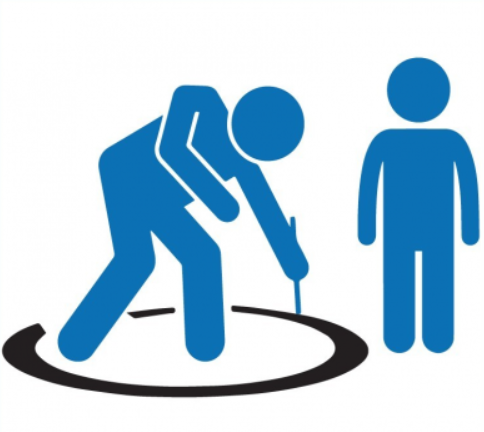Who is the Scrum Master? – The meaning of the Scrum Master role
The Scrum framework defines only three roles of accountabilities: the Product Owner, the Scrum Master and the Developers. The responsibilities are clear and the boundaries are sharp and well defined:
– The Product Owner owns the product from a business perspective and decides what the team develops,
– The Scrum Master’s responsibility is the product development process,
– Developers are, of course, responsible for creating the product and making the necessary technical decisions.
We have not yet encountered a situation where an organisation has questioned the need to carry out the actual product development work, i.e. to make the product. There have been occasions when they have been dubious about whether a dedicated person is really needed to make business decisions about the product, but this is not often the case either. Of the above three responsibilities, that of the Scrum Master, i.e. process development and support, is the one that organisations starting out in agile are most likely to try to dodge, as we wrote about in our previous article. So let’s take a closer look at who the Scrum Master is and why his role is so important.
What is the Scrum Master’s job?
“The Scrum Master is accountable for the Scrum Team’s effectiveness”, says the Scrum Guide. It’s hard to imagine a greater responsibility. But why is it presented separately? Why isn’t it part of the Product Owner’s or Developers’ responsibility, or even shared between them?
Before we answer, it is worth clarifying that by effectiveness we mean of the processes. It does not include, for example, obvious and insoluble competence gaps – if the role of dramatic coloratura soprano in an opera is assigned to a handsome bass, we cannot expect great success. But Scrum does not deal with such problems. Not because they are not important, but because they are outside the focus of Scrum, or even agility, which is strictly speaking product development. (You can read our previous articles on the meaning of Scrum here and on the relationship between Scrum and agility here.)
Returning to the question of effectiveness, it is easiest to think of the Scrum Master as a coach of a sports team. That coaches are indeed held responsible for their team’s success is evidenced by the news of coaches being laid off after losing matches and championships.

What does the Scrum Master do for the team’s effectiveness, what are Scrum Master responsibilities?
„…enabling the Scrum Team to improve its practices, within the Scrum framework”, continues the Scrum Guide’s description of the Scrum Master’s responsibilities. This short sentence contains a lot of information. Let’s look at it bit by bit!
„… enabling …”
The Scrum Master’s responsibility is to provide two types of conditions: external and internal.
Internal conditions, for example:
– the team to see opportunities for improvement and development
– the team should be motivated to improve working methods
– the team has the right knowledge and “soft” tools to formulate and implement improvements
External conditions, for example:
– the team receives appropriate feedback
– the team has the time and energy to stop, assess the situation and correct mistakes
– if necessary, the team should get help from the rest of the organisation
– the team has the physical means to formulate and implement improvements
„… the Scrum team …”
That is, Scrum Master supports both the Product Owner and Developers. They do not pull for either of them, their goal is to increase the effectiveness of the process and the team and to ensure a balance. Without a good Scrum Master, the process can easily be damaged: a strong Product Owner can overwhelm the Developers, with unrealistic expectations, and can push them to do so much work that is to the detriment of quality. At the same time, with a weak Product Owner, the team can slow down, unnecessarily increasing product development time and costs as well as the risks associated with late market entry.
„… to improve its practices …”
The Scrum Team owns their own working methods, they have full freedom within their scope of authority (You can read about this and the real meaning of self-organization in our previous article.)
„… within the Scrum framework …”
For Scrum to be successful, all team members must be familiar with the framework. However, they cannot be expected to understand the side effects of every process improvement ideas, as their main profession is still business expert, product development engineer, etc. This is why a Scrum Master with a deep understanding of the framework is needed, who can warn the team if they try to change in a direction that violates the Scrum framework. Of course, adherence to the framework is not important for Scrum’s sake, but to ensure that the results expected from Scrum can actually be achieved.
(You can read an excellent example of this in our article: “No need for a retrospective, we are so good at dealing with problems on the fly”)
What is a good Scrum Master like?
The Scrum Master is therefore a key link within the team, but also a link between the team and the rest of the organisation.
Just as a good coach knows the rules of the game, it is naturally important that the Scrum Master understands Scrum. However, as the basics can be learned quickly, it is more important to be interested in the framework, to look for and research different techniques and practices to help your team.
It is important that you understand the area in which your team is working. Just as we don’t expect a coach to be able to score a goal, but to understand what a goal is and what is needed to score it, a Scrum Master should have the right technical affinity rather than strong product development skills. The Scrum Master should be able to recognise when the team is stuck, even if the team itself hasn’t figured it out yet. He should be able to translate and mediate between the Developers and the Product Owner, or between the Scrum Team and the rest of the organisation, if necessary.
But the most important thing is that the Scrum Master has good soft skills. A Scrum Master works with people, so it is much more important than the above mentioned skills that he/she has a good sense of communication, the ability to listen, teach, explain, motivate, mediate, give feedback, etc.
„Scrum Masters are true leaders who serve the Scrum Team and the larger organization.”, says the Scrum Guide.
Who makes a good Scrum Master?
Of the above three: Scrum/Agile knowledge, technical knowledge, soft skills, if you can only choose one, it should be the third. The soft-skills (sometimes called people-skills) are the most important skills of the Scrum Master, and they take the longest to learn, to the point that some writers even doubt their learnability.
It is more difficult, but equally important, for the team to trust the Scrum Master. This can be particularly difficult when the previous position of the person selected as Scrum Master conflicts with the role of Scrum Master during an agile transition. Even if the command-and-control manager, who is still iron-fisted on Friday, promises to be a motivating and supportive coach from Monday, the chances that the team will believe this are slim. Look for a candidate for the Scrum Master role who starts from at least scratch and not from behind.
How to become a Scrum Master?
Although training is essential, both the basic methodology training and the dedicated Scrum Master training, the real knowledge can only come from experience. If you have the opportunity to participate in an agile implementation, by all means take it, because you can learn years of knowledge from consultants in a few months.
Although the Scrum Guide states that the introduction of Scrum is also the duty of the Scrum Master („The Scrum Master is accountable for establishing Scrum as defined in the Scrum Guide. They do this by helping everyone understand Scrum theory and practice, both within the Scrum Team and the organization”), in our experience it is not usually successful without external help.
The Scrum Master role requires continuous learning. Fortunately, the framework is evolving, the literature on agility is vast and knowledge sharing within the agile community is natural. But lifelong learning is important not only because of the evolution of the methodology. The Scrum Master’s job may change from day to day, but it certainly changes from Sprint to Sprint. One Scrum Master attitude, which is valuable for a team that is just starting out, can be a drawback for an experienced and cohesive team. So a good Scrum Master changes with their team, because only in this way can they help and support them.
Scrum Master Salary
The salary for Scrum Masters can vary significantly depending on factors such as location, experience, industry, and company size. In Hungary, for example, the average monthly gross salary for a Scrum Master ranges from approximately 800,000 to 2,000,000 HUF according to the 2024 Hays Salary Guide. Some experienced professionals may earn salaries at the upper end of this range. Also in regions with a high demand for skilled Scrum Masters, such as Budapest or other metropolitan areas, salaries tend to be on the higher end of the spectrum. Additionally, obtaining relevant certifications such as Certified ScrumMaster (CSM) can often lead to better career prospects and higher earning potential for individuals in this role.
Certificate or no Certificate?
As mentioned above, training is a necessary but not sufficient condition to become a Scrum Master. However, it is important to make the right choice of training: if an international certificate is an important aspect – after all, who wouldn’t want to shine with it on LinkedIn – we recommend the Certified ScrumMaster training.
You can find courses with the title “Certified ScrumMaster” at several training companies, but it’s worth checking who the certificate issuer is: at Sprint Consulting’s certified trainings you can get the certificate of Scrum Alliance (the largest and most influential professional agile community and organisation), but there are also Scrum.org, ICAgile, and other internationally less well-known or appreciated certification organisations besides the ones listed.
If you are less interested in the international certificate and more in the depth of the knowledge you can acquire, you can also participate in our Advanced Scrum Master training, led by our consultants who know both the Hungarian and the international market well. At the end of the training, you can obtain your own Sprint Consulting certificate (one of the most trusted ones in Hungary). This course requires hands-on Scrum and Agile experience and provides participants with an advanced toolkit to take their enterprise agility to an even higher level.
Summary
Just like no professional sports team tries to fare without a coach, the role of the Scrum Master is essential for product development teams. A good Scrum Master can multiply the effectiveness of the team, and therefore the whole organisation.



